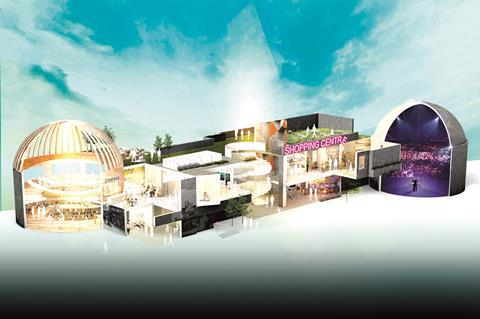Shopping centres were envisaged as places to concentrate all the attractions, convenience and excitement of the town centre under one roof – a microcosm of the city. But the acceleration of online shopping could see malls increasingly becoming stale and redundant as our shopping habits become more virtual.

Contrast this with leading thinking in workplace design, which envisages increasingly dynamic, multi-activity environments encompassing an ever-broader range of work styles, neurodiversity and preferences – could a mall be reimagined as a modern ‘one-size-fits-all’ workplace?
While the mall as a shopping destination may be in decline, the architectural concept of ‘anchor tenants’ linked by a ‘street’ featuring smaller attractions and functions still works.
Our concept retains the classic shopping centre structure but in place of the old ‘anchor-tenant’ department stores at either end, there is a ‘hyper-focus’ space at one end – a place for quiet and deep concentration – and a ‘hyper-collaboration’ space on the opposite end, where collective minds come together in a vibrant environment. These are linked by a network of transitional spaces that progress from focused, quiet spaces to dynamic and collaborative environments.
Malls could become stale as our shopping habits become more virtual
The ‘hyper-focus’ anchor houses a library, leading to a series of smaller spaces including mindfulness booths, sleeping pods, recharge rooms, mothers’ rooms, a wellness hub and an art gallery.
The central staircase leads to dynamic, team-building activity spaces including a climbing wall, workshops, escape rooms and strategy rooms, building up to the ‘hyper-collaboration’ anchor: the auditorium.
The ground floor will become a permeable space inviting people to work, create, relax and collaborate inside. Bike parks and electric charging will be provided and pockets of green spaces will host impromptu events and social gatherings around the base of the building. The ground floor will also contain retail conveniences that cannot be provided virtually – such as coffee shops, bars, launderettes, printing rooms and tech-support hubs.
The old rooftop car park will be repurposed to create a ‘rooftop oasis’, an accessible and biodiverse community garden for relaxation and gardening, where fruit and vegetables are grown and outdoor fitness activities can take place.
The great design challenge: centre forward
- 1
- 2
 Currently reading
Currently readingThe great design challenge: AFK
- 3
- 4
- 5
- 6
- 7
- 8
- 9
- 10






































No comments yet